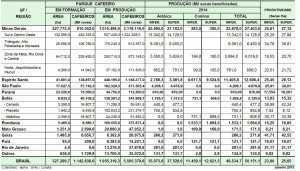MILAN – In its first estimate for the crop year 2014/15, Brazil’s National Supply Agency Conab has pegged the next harvest at 46.53 to 50.15 million 60-kilogram bags, or between 5.4% less and 2% more than in 2013. Brazil’s Arabica coffee output should drop between 2% and 8.4%., hobbled by falling prices on world markets, the forecasting agency said on Thursday.
Producers will reap between 35.1 million and 37.5 million 60-kilogram (132-pound) bags of the mild-tasting variety this year, down from 38.3 million last year, even as most trees enter the higher-yielding half of a two-year cycle
This will be the first time since 2005 that Arabica production will fall in a higher-yielding year.
“This fall is due to a reduction of planting areas resulting from lower prices paid to producers and bad weather conditions such as frost which reached the southern state of Parana in 2013, ” Conab noted in a statement.
Brazil currently has 1.96 million hectares of coffee plantations, 3% less than in 2013.
On the other hand, the Robusta harvest, which represents 25 percent of the coffee produced in Brazil, is expected to total between 11.5 and 12.6 million bags, up between 5% and 16% over 2013, Conab said.
“Numbers came below expectations and add a certain level of uncertainty to the market,” said Gil Barabach, a coffee analyst at Safras & Mercado in an interview with Bloomberg . “Everyone was very confident in a bumper crop,” he added.
In Minas Gerais, Brazil’s leading coffee producer, the next crop is projected to decline between 6.4% and 0,9%.
Production in Espirito Santo, Brazil’s biggest conilon (Robusta) producer is pegged at 11.4 to 12.6 million bags, down between 2.5% or 7.8% on year due to a lower Arabica output.
It should be noted that the crop of Robusta is expected to jump between 4.95% and 16%.
Production is expected to surge in San Paolo, Bahia e Rondonia and to fall sharply in Parana.
The physical harvesting of the new Brazilian crop will start in late April.




















